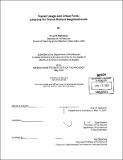Transit usage and urban form : lessons for transit reliant neighborhoods
Author(s)
Mathema, Kiran B. (Kiran Bhakta), 1970-
DownloadFull printable version (15.70Mb)
Alternative title
Transit reliant neighborhoods
Other Contributors
Massachusetts Institute of Technology. Dept. of Architecture.
Advisor
Julian Beinart.
Terms of use
Metadata
Show full item recordAbstract
Cities are all about people and places. Travel occurs because people want to get to places - places of work, places of residence, places of shopping and so on. Hence, it is people and places that are more important, not transportation. Ideally, we want to minimize travel so we can spend more time socializing , at desired destinations, rather than on transit. However, the paradigm of city design seems to have shifted over the years - from people and places to automobiles. The cumulative effects of planning for efficient movement of the car and enhanced automobility have revealed themselves in the form of urban sprawl, energy depletion, air and noise pollution, climate change, road fatalities, and segregation of people by class and race. For the sake of social equity and sustainability, it is thus important to increase reliance on transit services. However, merely infusing transit services into an auto-based environment is not likely to reap many rewards or radically change behavior. The fact that availability of subsidized transit services (in almost all regions of the US) has not lured the middle class out of their cars indicates a loophole in the present understanding of its usability. Many argue that one can only lessen the use of car by demand-management strategies, such as constraints on parking, increase in automobile and gasoline prices, and guaranteed rides home for car-poolers. Does this imply that in the absence of punitive pricing on automobile usage, the transit services are doomed to fail? This Thesis argues that transit ridership depends more on the way transit service relates to its location - and if we want to enhance transit usage, the 'transit service'-'urban form ' nexus matters. Based on this premise, the thesis explores how urban form influences transit usage and how development should be directed in order to increase reliance on mass transit.
Description
Thesis (S.M.)--Massachusetts Institute of Technology, Dept. of Architecture, 2000. Includes bibliographical references (leaves 53-54).
Date issued
2000Department
Massachusetts Institute of Technology. Department of ArchitecturePublisher
Massachusetts Institute of Technology
Keywords
Architecture.